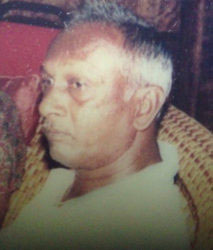After six years awaiting trial, Godfrey Gill, one of the men who broke into the home of Better Hope pensioner David Ramkissoon and killed him during a robbery, yesterday learned that he has just about five more years behind bars.
Gill, called ‘Chucky,’ was sentenced on Friday to 11 years and four months in jail for the crime and Justice Simone Morris-Ramlall ordered that the prison authorities make deductions for the time Gill would have spent on remand.
He had been incarcerated since 2016.
At his arraignment last month, Gill pleaded not guilty to the capital offence, but admitted on the lesser charge that he, in the company of others, killed Ramkissoon during a robbery on August 21, 2016.

At his sentencing-hearing yesterday afternoon, Gill, in apparent tears, apologised to the relatives of the deceased and stated that he regretted not having exercised better judgment as he was being influenced by company of questionable character.
Defence attorney Dexter Smartt, who represented Gill, made an impassioned plea for clemency, advancing that his client had accepted responsibility for his actions at the first-given opportunity in his quest to bring closure and justice to the family of the deceased.
He said too that the 29-year-old man still has potential for rehabilitation, especially given the favourable report from prison officials, who described him as a model prisoner who had since made use of anger-management and other skills courses.
Prosecutor Caressa Henry, however, asked Justice Simone Morris-Ramlall to visit Gill with a sentence that would reflect the nature and gravity of the offence and which would also act as a deterrent to potential offenders.
She asked the court to reject Gill’s claim of being negatively influenced by peers, stating that he made a choice with which he must now live and the consequences of which he must also face.
Victim impact statements from the son and daughter-in-law of the deceased, described him as loving and caring.
Anandram Kissoon said that his father was a pillar in his life and his death continues to take a toll on him daily. He said he finds it difficult to stay motivated as he is still devastated and in a state of shock that his father is no-more.
Justice Morris-Ramlall said that after considering both the aggravating and mitigating factors, 19 years was an appropriate base for the sentence. She deducted two years for the mitigating factors and then made the mandatory one-third deduction for the early plea, leaving 11 years and four months.
The facts presented by the State were that Gill and two others broke into the elderly man’s home while his family had been out.
The court heard that they encountered Ramkissoon, called ‘Dillip’ and ‘Short-man,’ whose throat they slit with a knife.
They then ransacked the house before carting off a quantity of cash, jewellery and other items.
Henry had told the court that upon his return home, the man’s son found him in a kneeling position on the floor in a pool of blood.
She said that during investigations, Gill would later admit to the police that he and two other persons had robbed and killed the 76-year-old man.
The prosecutor said that Gill also related that they divided the money they had stolen, from which he got $25,000.
An autopsy revealed that Ramkisson died from shock and hemorrhage, due to incised wounds to the head and neck.
The dead man’s daughter-in-law, Nalini, had previously related to this newspaper that she left him relaxing in their hammock, while the house was tightly secured. The family had left to visit a creek along the Linden/Soesdyke Highway. According to her, hours later, she called the landline but the calls when unanswered.
When they returned home, the house was completely dark, which they found to be quite unusual. Nalini had said her husband, Anand Ramkissoon, went to check on his father and found the house ransacked and his father dead.
There was a hole in the back fence, which the family suspects the bandits used to gain entry to the property.





